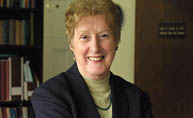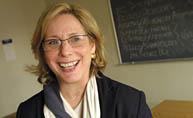Critical Care (Page 2)
The Grand Scheme
Although ambitious, the School of Nursing's plans will do comparatively little to replenish Canadian nursing. Most of the profession's personnel gains will have to come from larger university programs and, in Quebec, from the CEGEP system's program in nursing, the basic trainer of more than 75 percent of the province's registered nurses.
But it has never been McGill's style to race to quick solutions at the expense of quality. The School of Nursing's ultimate contribution to the Canadian crisis will be through innovation, research and rigour, a steady raising of the bar, which is not at all new to the habitués of Wilson Hall. "We'll always be relatively small," adds French. "But we want to have absolutely top quality of education and research that will put us on the international map."
Rigour is written across the school curriculum, and across the faces of its bright and intense nursing students. Alongside a battery of nursing classes, students are required to take courses in molecular biology, human physiology, social psychology, pharmacology, pathology. Stiff medicine, but it works.
"McGill's program has always been heavily oriented toward the biological and social sciences," explains French. "But it's increasingly important in today's health care system with its complexity of problems that we understand what's happening to the patient. If the nurse can assess the patient, identify what is happening and take corrective action, we will have better outcomes."
The need for savvy assessment has become more immediate in Quebec, where a recent expansion of the Nurses Act increases the responsibilities of nurses to evaluate physical and mental conditions of symptomatic patients, to perform more invasive procedures, and to adjust prescribed medications. In anticipation of these increasing demands, the School of Nursing overhauled its curriculum in 2002, updating existing courses and adding new ones that address societal, demographic and geographic health trends, modern drug action and patient assessment. The clinical workload also increased dramatically, under the guidance of 175 preceptors - registered nurses who serve as faculty-in-the-field. In the BSc(N) program, for instance, students synthesize classroom learning with more than 1,200 coordinated hours of increasingly hands-on work in surgical, pediatric, mental health and community nursing alongside clinicians in Montreal-area hospitals, community health centres, retirement homes and home-care agencies. Each year is capped by a full-time clinical practicum, and the program culminates in an eight-week internship in an area of individual interest.
"We used to have students graduating feeling like they knew a little about everything, but nothing in depth," says Madeleine Buck, faculty lecturer and coordinator of the BSc(N) program. "We don't get that feedback now that we've added these concentrated blocks of clinical experience at the end of the year. They feel like they're pulling things together."
It's also where the McGill Model of Nursing, the School's revolutionary approach to nursing care, begins to come into focus.


From left: School of Nursing Director Susan French; Nursing professor Laurie Gottlieb.
Photos: Owen Egan
A Model Philosophy
According to Dr. Laurie Gottlieb, BN'69, MSc(A)'74, PhD'85, a long-time McGill Nursing professor and editor of the school's Canadian Journal of Nursing Research (CJNR), the vaunted McGill Model dates back nearly to the school's founding in 1920 as an academic alternative to the trial-by-fire, on-site training programs in Montreal hospitals. The school's second director, Bertha Harmer, wrote seminal texts on the principles and practice of nursing, including the peculiar notion of including the family and environment as vital elements in a patient's health care and recovery.
This contextual orientation imbued the school's teaching through the next decades and into the 1960s, when McGill Nursing looked to supplant the rigid old hospital protocols with a method that relied more on learned information and patient observations -from nursing by rote to nursing by reason. By the early 1970s, the School of Nursing was at the vanguard of the profession's quiet revolution to claim a role for nurses that was complementary rather than subservient in health care's rigid caste system.
The prime mover of this advance was Dr. Moyra Allen, one of Canada's first great nurse-academics, whose contributions to the McGill School of Nursing are indelible. During a career that spanned four decades, Allen reinvented the school as a centre of practice, research and education, created the Master's Direct Entry program, and founded Nursing Papers, a bilingual academic journal that evolved into today's CJNR.
In the early 1970s, Allen began weaving together the threads of an unconventional approach to nursing. The McGill Model, as it would eventually be called, viewed coping and recovery in the context of a family (in the broadest definition), focused on a patient's strengths over illnesses, and collaborated with the patient rather than requiring unquestioning compliance.
"The McGill Model of Nursing was novel and is novel," says Gottlieb, a student of Allen's before joining the faculty in the 1970s. "When I would leave McGill and lecture all over the world, it was a shock to find that the world didn't think or practice the way we did. I just assumed that the only way to care for people was the most humane way: assessing their uniqueness and working with it."
Today the McGill Model, or a close facsimile, is being adopted around the province, across Canada and around the world - in Japan, China, Switzerland. In the McGill University Health Centre (MUHC), the McGill Model of Nursing is so integral that the clinics work as de facto living case studies. Gottlieb says the model works because of its essential humanity, but also its flexibility. "In the '60s there was a real need to develop models of nursing. But the McGill Model always was a misnomer," she says. 's a perspective, a philosophy, a value system rather than a model, which is generally narrow and restrictive. It's so open that you can easily integrate the latest ideas and empirical research."


